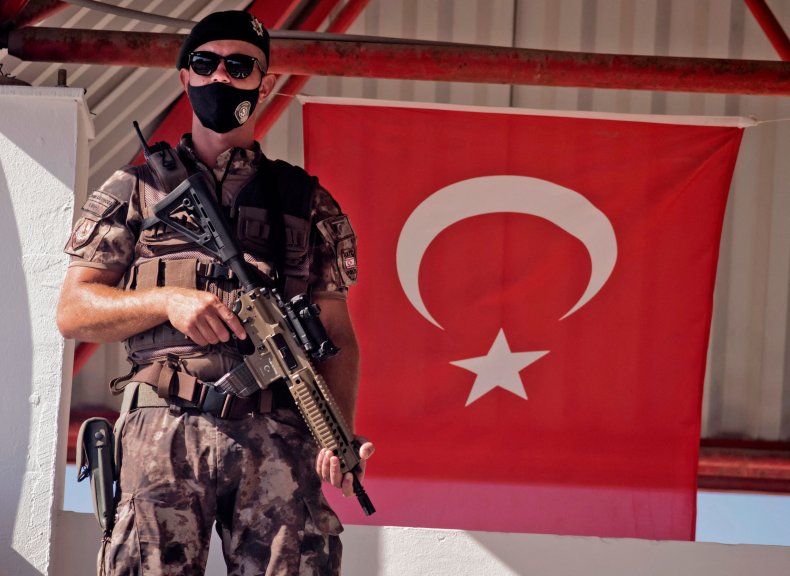After attending Eid prayers in Turkish-occupied northern Cyprus, Turkish president Recep Tayyip Erdogan spoke about Afghanistan. “We have nothing against their beliefs,” the strongman said of the Taliban. He doubled down on the Taliban’s anti-American narrative: “Imperial powers entered Afghanistan; they have been there for over 20 years. We also stood by our Afghan brothers against all imperial powers.”
It’s good that Erdogan is finally acknowledging what any visitor to Afghanistan who got outside the bubble of the U.S. embassy or Bagram Air Base could see: Turkey may have formally been part of the same NATO mission, but it was on the opposite side of the battle. Billboards erected by the Turkish embassy in Kabul promoted Islamic solidarity rather than democracy.
Ross Wilson, the acting American ambassador in Kabul, previously served as ambassador to Turkey. His tenure in Ankara coincided with the State Department’s dismissal of the notion that Erdogan sought an Islamist order. Fifteen years ago, Wilson famously characterized Turkey’s liberal opposition as a “cacophony” unworthy of attention. Once again, he refuses to speak up when it matters.
Erdogan’s depiction of Turkey as a bastion of anti-imperialism is not new—though it is an increasingly common theme of Turkish propaganda. Consider Ankara’s justification of its deployment to Somalia. “The 16th century was the first time Turks entered Somali territory…to rescue Mogadishu from the Portuguese navy,” an article in Daily Sabah, a government mouthpiece, explained. “After three centuries, the Ottomans were in Somalia again to help the local people who were resisting a British invasion and suffering from a humanitarian crisis.” As for Turkey’s 2011 deployment? “This time it was to provide humanitarian aid when the Somali government made an international call for help to deal with drought and famine…. After the two peoples remembered each other, Turkey decided to take a permanent position in the country, which has vast resources and located very strategically [sic].”

In 2016, Erdogan himself took to the paper to write, “Turkey, unlike colonial powers, has a history in Africa with no dark chapters.” Talk about a whitewash of history. Those whom Ottoman slave traders seized from Africa’s Great Lakes region, or who lived in Ottoman colonies in North Africa, might dispute it. Erdogan, however, gambles on the knowledge that Western diplomats are too polite to call out his historical revisionism, much of which promotes Turkey at the expense of the United States and Europe. Court journalist Ilnur Cevik doubled down on Erdogan’s theme: “The Africans see clearly that the Turks are here as partners, as brothers and sister, and not as the people who came from the West to exploit their rich resources and oppress them.” The Biden administration may want to promote diplomacy and U.S. aid, but failure to respond to Turkish slander blunts its efforts.
The reality is that Turkey is today the world’s leading imperialist state. Russia and China might seek to gobble up areas alongside their borders, but Turkey goes further. More than a century ago, Turkish nationalist forces systematically forced out or exterminated eastern Anatolia’s Armenian population. Perhaps one reason Turkish nationalists and Islamists refuse to recognize that genocide is that it would condemn their playbook today.
That playbook and the rewards of Turkey’s strategic patience is now on display in Cyprus, where Erdogan plays both the European Union and the United Nations like a fiddle. He consolidates and expands Turkish ethnic cleansing and economic exploitation while diplomats hope for an opening or acquiesce to yesterday’s aggression as today’s irreversible status quo. Turkish colonization in Syria is just as blunt. Turkey and its proxy militias force locals to take Turkish names, dress in a Turkish Islamist style and learn Turkish. Turkey even extends its civilian infrastructure into portions of Syria it occupies. Syria, it turned out, was a dry run for Iraqi Kurdistan, where Turkey establishes military bases and its diplomats and intelligence agents act as colonial governors, aided by an increasingly quisling Barzani family willing to trade national sovereignty for cash and contracts. In Libya, too, anti-imperialist rhetoric distracts from the fact that Turkey does the opposite of what it preaches.
Back in Afghanistan, Turkey may want to ingratiate itself to the Taliban for ideological reasons and to win contracts if and once the Taliban takes over the country. That is bad enough—as it reveals that Erdogan considers Turkish interests and human flourishing to be mutually exclusive. But in addition to being an assault on the truth, Turkey’s willingness to use the rhetoric of anti-imperialism to promote itself at the expense of Western security comes at a potential cost to American lives, giving the green light to Ankara-backed jihadists. It is time for Secretary of State Antony Blinken to stand up, acknowledge Turkey is no partner and call the country what it is: a 21st-century colonizer that poses a growing threat to world peace.
Michael Rubin is a senior fellow at the American Enterprise Institute.
The views expressed in this article are the writer’s own.




